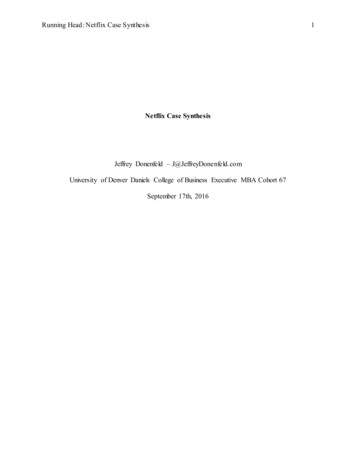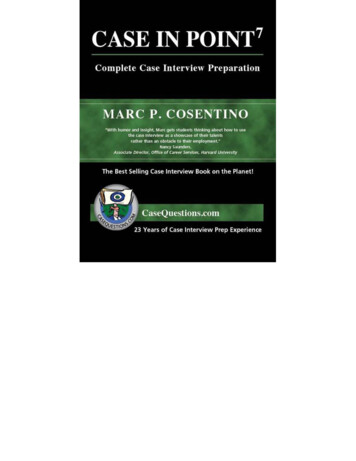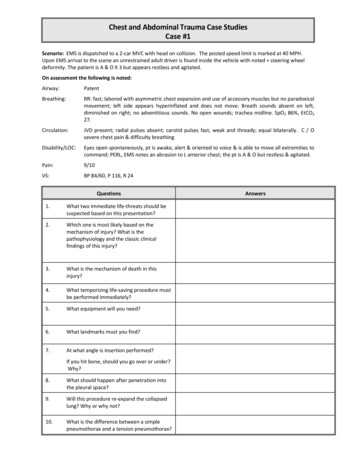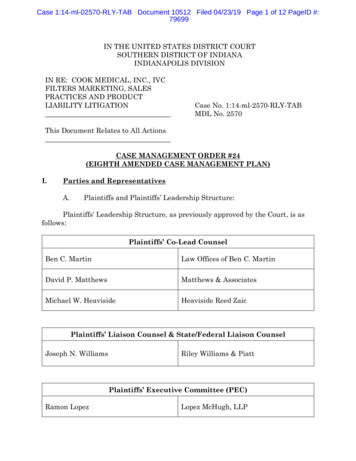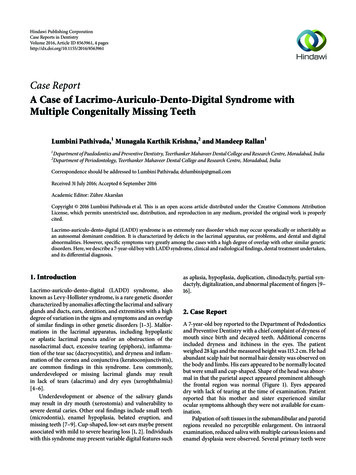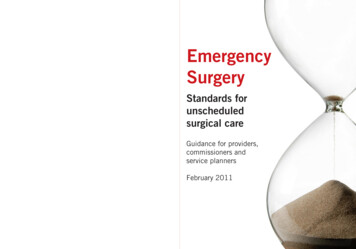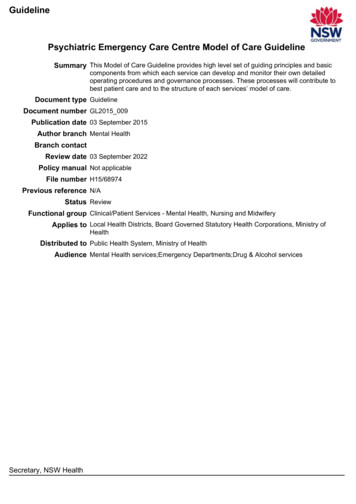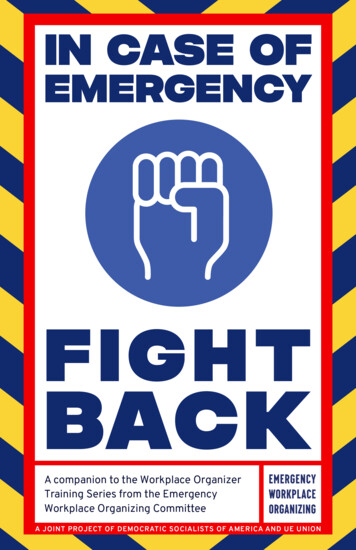
Transcription
IN CASE OFEMERGENCYFIGHTbackA companion to the Workplace OrganizerTraining Series from the EmergencyWorkplace Organizing CommitteeA JOINT PROJECT OF DEMOCRATIC SOCIALISTS OF AMERICA AND UE UNION
WHENWEFIGHTWE WIN!Working class peopleeverywhere are under attack.WORKERS ACROSS THE WORLD HAVE BEEN PUTTINGtheir lives and the health of their families at risk for a year,simply to pay the bills and put food on the table. Whileessential workers have endured long hours and hazardousconditions to keep our schools, hospitals, grocery stores,and economy open, corporate elites have made recordprofits without providing higher wages or improved benefits.Our political leaders have failed to enact, let alone propose,the kind of plan that would truly protect the lives andlivelihoods of the working class. When workers unite andtake collective action, however, we have the power to forge abetter future for ourselves and for our families.2That’s where you come in. By organizing your workplaceusing the best tools and principles experienced workplaceorganizers have to offer, you can win relief against unsafeworking conditions during COVID-19. You will also build thefoundations for future victories against bosses, capitalists,and politicians who stand in the way. The EWOC WorkplaceOrganizer Training Series is designed to democratize theskills you and your co-workers will need to do that.Organizing is based on skills that anyone can learn.Reflecting on your workplace struggles through the EWOCOrganizer Training Series, you will acquire the means tobecome the workplace organizers that will lead and grow thelabor movement, demanding safety, dignity, and respect forall workers along the way. We’re fed up with being exploitedby wealthy CEOs and taken for granted by establishmentpoliticians. We’re fed up with being called “essential” thentreated as disposable. It’s time for a change and we’re notstopping until we get it. We have a world to win!While this handbook provides a summary of key conceptsfrom our training series, it is not a standalone manual!If you want to organize your workplace, but don’t knowhow yet, join our training series or contact EWOC atworkerorganizing.org to receive support from anexperienced organizer. Check the last page for how tosign up!–EWOC Training Team3
Training overviewThe EWOC Workplace Organizer Training Series detailedbelow promote a model of militant rank-and-file organizingthat centers workers and prioritizes democratic massaction like demonstrations, pickets, and strikes as a meansof forcing concessions from the capitalist class. EWOCorganizers learn how to empower fellow workers to leadtheir own struggles, because working-class power can onlybe achieved by the workers themselves.1.Each training is designed to teach one basic skill thatcombine to form a systematic workplace practice toempower the democratic majority of workers in a workplace.3.2.4.IDENTIFYING LEADERSIdentify co-workers who will lead democraticmajorities in struggle.WORKPLACE MAPPINGVisualize the power you have built, identify obstacles,and select tactics to build active, engaged majoritiesand take on employers.ORGANIZING CONVERSATIONSEncourage co-workers to identify their ownworkplace issues, understand how and why youremployer is an obstacle to the conditions that youdeserve, and visualize and commit to collective actionto win on those issues.ESCALATION AND CAMPAIGNARCSArticulate a winning strategy and integrate yourcommunities in struggle.5.PUBLIC ACTION AND ENGAGINGWITH THE BOSSConfront your bosses and take risky action safely andeffectively.6.INOCULATION AND THE BOSSCAMPAIGNPlan for intimidation and retaliation from youremployer.5
identifyingleadersMINDKNOWLEDGEABLEABOUT THEIRWORKPLACE,GOOD LISTENERGood organizers don’t go it alone. Organizing campaignsrequire strong relationships and a team of respectedworkers who can lead the majority of your co-workersin struggle. In organizing, democracy is power and yourcampaign will always be stronger if the supermajority ofyour coworkers feel their voices are represented through it.Bosses know this and will try to divide you however they can— be it race, class, job title, gender, sexuality, etc. In orderto ensure strong internal democracy, your leaders shouldbe representative of your coworkers, empathetic to theirexperiences, and respectful of their decisions.Although leadership can look very different in differentworkplaces, leaders must be respected and trusted.Natural leaders are often good listeners, compassionate,and knowledgeable about their coworkers. Leaders havefollowers: coworkers who trust their judgment and listen tothem. (There may be multiple worker leaders at any givenjob.) Finally, we are workers, we are people, and we are notstatic. Someone who is not a leader can become one andsomeone who starts as a leader can lose their coworkers’confidence. Democratic leadership is a constant practice.HEARTCOMPASSIONATE,HONESTP thinking through it Think about your coworkers at your current job.Who has the most followers? Who is the most respected? How do you know? Try identifying some of the leaders at your pastworkplaces too. Do you see any patterns?6GUTSCOURAGEOUS,WILLING TO MOVECOWORKERS INTOCOLLECTIVE ACTION7
Mapping andassessmentsWe need systems! Organizing isn’t an ad hoc seriesof conversations; being able to visualize workplacerelationships is integral to successful worker strategy.Keeping an updated list of your coworkers, your outreachto them, their different social groups, and their currentattitude towards your campaign, i.e. their assessment level,is an excellent way to ensure you’re doing systematic andeffective organizing.A standard assessment scale is 1 Leader, 2 Activist,3 Undecided, 4 Leaning Against, 5 Anti-Leader,0 Unassessed. Remember to keep that informationprivate from your bosses and never forget that workplaceassessments are only a helpful shorthand — your coworkersare human beings who can change their minds!P thinking through it What are the different social groups at your currentworkplace? How were the cliques organized? Whowere the leaders of each clique? How would you go about building a list of yourcoworkers in your workplace? Does your companymake one accessible to everyone? If not, who wouldyou go to in order to help you build that list? What are some creative ideas for how to get a list ofyour coworkers names (and ideally contact info)?89
OrganizingconversationsAlthough it’s good to build relationships through casualconversations, structured organizing conversations ensurethat your outreach is effective. Though no two conversationsare alike, a good organizing conversation has six essentialparts:1.2.3.4.5.6.Introduction: Who you are, what your concerns are.Get the issues: What does your coworker care about?Agitation: Why is this unfair?Plan to Win: Why collective action? What’s the plan?Inoculation: Prepare for your boss’s response.Call the Question: Ask them to take action.Organizing conversations should be organic, allowing youto listen and respond to the other person in a way thatfeels natural. This means that sometimes you won’t movethrough the full structure of the organizing conversation;however, learning what your colleagues care about is alwaysimportant. One way to practice natural conversations is toroleplay!P thinking through it Who is someone on your team, a friend, or comradethat you can practice organizing conversationswith? Will you ask them to role-play with you? Did you feel like you listened more than you talkedduring the conversation? Why/why not? How often did you find yourself making a statementwhen you could have asked a question? Why?1011
Escalation andcampaign arcsCampaigns arcs are dynamic, flexible, and active. Thearc of a campaign is not set in stone — it depends entirelyon your goals. But one thing is for sure: the time will comewhen you need to escalate the pressure on your employerin order to move your campaign closer to your goals. Youneed to know when to take it to the next level, and when tobe patient, when to jump on an unexpected opportunity, andwhen to stay the course.Every organizing campaign is built to win demands thatworkers formulate together to affect issues that are eitherdeeply felt, broadly felt, or both. Forcing employers tomeet those demands and respect you and your coworkersleads to real improvements in pay, working conditions, andworkplace safety. To win, you need to know who the keydecision-makers are, what they care about, and how tocompel them to say ‘yes’ and meet your demands by puttingescalating pressure on them. Pressure comes from twosources: strength in numbers and public scrutiny.P thinking through it What issues are most deeply and broadly felt atyour job? How do you know? Think through your job/community. Who hasdecision-making power over an issue you careabout? What do these decision-makers care about,tangible or intangible? How could you and yourteam get in the way of what they want?1213
Public action andengaging the bossIdeally, every secret campaign will eventually reveal itselfthrough some kind of public action. To maximize yourchances to win, public actions should involve clear roles andresponsibilities, contingency plans, and logistical details.Successful public action will show your boss that you areorganized, strong, and determined to win.However, we need to remember that engaging with theboss is a scary prospect for the vast majority of workers.People will need to prepare themselves and their coworkersfor the anxiety of confronting someone with direct powerover them. Make sure to debrief with everyone who has todirectly confront the boss during an action and help themprocess the experience so they come out feeling powerful.P thinking through it Imagine confronting an authority figure who hasdirect say over your living conditions (wages,benefits, employment). What would be goingthrough your head while you are demanding theymake a change? What would you and your coworkers do if theyresponded positively/negatively? How would youexit that situation with strength? Think about a protest/direct action/rally/etcyou have been a part of. What were roles younoticed people taking on that would have requiredpreparation?1415
Inoculation andthe boss campaignFear and doubt are organization killers: if your bossretaliates or makes easy concessions, your co-workers maylose confidence in your campaign or lose a sense of urgency.The best way to prevent this is by preparing your co-workersto expect the boss’s playbook of anti-organizing tricks andtactics. You can inoculate yourself and your coworkers tothe Boss Campaign by thinking through how your boss willreact to your organizing and preparing yourselves to keepyour eyes on the prize when faced with of their reaction.When thinking through how to respond to your boss’sreaction, remember that your audience is your other coworkers on the fence, not your boss. By understanding howemployers operate, you can combat their efforts to divideand conquer.Solidarity BustingBingo Card“I just wishyou’d cometo me first/Unnecessaryconflict!”New Toaster/Curtains/Quick Fix“This couldhurt yourcareer.”“We see you/We hear you/We’relistening.”“Give us achance to fixthings.”“We’re afamily!”The suits showup and startsmiling andshaking hands“We’re alreadyworking onmaking a lot ofthese changes.”Pizza party!“You don’t haveto work here ifyou don’t likeit.”Promotions/Better hours/Pay boost foranyone whogoes againstthe campaign“If you don’tfeel safe we’llhelp yougo on unemployment.”Union bustingis disgusting,eat the richuntil there’sjustice!“We don’t haveroom in thebudget/I’d bebetter off justshutting down!”“We know it’syou.”“We just wantyou all to knowhow much weappreciatehow hard youall have beenworking.”Cookies andcake!Small payincrease!“Why shouldI give you araise when theX make evenless? That’s justselfish”P thinking through it Based on what you know about your own boss,what kind of concessions, incentives, respect, andfavors might the bosses use to persuade workersnot to organize?“You’re makingpeople uncomfortable.”Delay, delay,delay“We’re allmakingsacrifices.” Based on what you know about your own boss,what kind of attacks, fearmongering, threats,warnings, and toxic behavior should you expect?Organizingleads startgettingscheduled less“If we do thatthen yourpatients/customers/students/etc.will suffer.”“That will takemonths toaccomplish.” Considering your audience is your coworkers, howwould you respond to concessions from your bossso your co-workers stay organized? How would yourespond to retaliation?161717
call to action!No organizing would be complete without a call to action.There are many ways to take the next step, whether thatis participating in an EWOC training, joining the EWOCteam, or working with an organizer to start organizing yourworkplace. Will you join us in building a worker movementthat will fight for justice in every workplace?Volunteer with EWOC:workerorganizing.org/volunteer/Talk with an EWOC Organizer about organizing ganizer/Already have an organizing success story?We’d love to hear about it! Send your stories toworkerorganizing@gmail.comWritten by the EWOC Training Team 2021Design and illustration by Stephen CroweThe Emergency Workplace Organizing Committee (EWOC)was founded by the United Electrical Workers (UE) andDemocratic Socialists of America (DSA) in March 2020 inresponse to the COVID-19 crisis.EWOC uses distributed organizing techniques and a massvolunteer base to provide support and training to non-unionworkers. We focus on developing workplace issue fightsand supporting worker leadership development. Our jobas organizers is to build the resources, the networks, andthe training workers need to win their demands during thepandemic and beyond.And if you haven’t already, join nizing.orgLicensed under Attribution-NonCommercial 4.0 International.To view a copy of this license, visit http://creativecommons.org/licenses/by-nc/4.0/1819
workerorganizing.orgA joint project of Democratic Socialists of America and UE Union
Organizing conversations should be organic, allowing you to listen and respond to the other person in a way that feels natural. This means that sometimes you won’t move through the full structure of the organizing conversation; however, learning what your colleagues care about is always i
